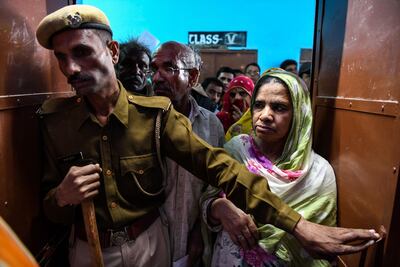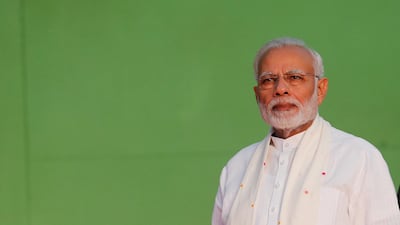Parimal Shah, who runs one of of India's largest manufacturers and exporters of Assam tea, watched the results of key state elections last week with bated breath, because of their implications for his business and the wider economy.
These state elections were widely described as “the semi finals” ahead of India's general election, which will be held by May. In the polls, prime minister Narendra Modi’s ruling Hindu nationalist BJP ended up losing three states it controlled – leaving some business leaders like Mr Shah worried. The national election next year is now expected to be a much closer race with the opposition Congress party than previously expected.
“This has led to a lot of people seriously doubting the ability of the ruling party to retain power in upcoming national elections,” says Mr Shah, the president of MK Jokai Agri Plantation. “Many fear that a coalition government [of the Congress and its smaller allies], where no one political party shall gain majority may come to power in the national polls. If this happens, it would certainly lead to a chaotic economic situation.”
India is the world's sixth largest economy and Asia’s third biggest with gross domestic product (GDP) of $2.6 trillion. With a population of more than 1.3 billion the consensus is that India needs strong levels of economic growth above 8 per cent to create jobs for its citizens.
The latest official data revealed that India's economic growth slumped to 7.1 per cent in the quarter to the end of September compared to 8.2 per cent in the previous quarter.
It was in the states of Rajasthan, Madhya Pradesh, and Chhattisgarh, known as the “Hindi heartland” and considered BJP strongholds, the BJP was ousted by the opposition Congress party, according to the results that emerged on Tuesday and Wednesday showed.

Dushyant Jani, the founder and chief executive of Mobclixs Technologies in Mumbai, says that despite the results of the state elections, he believes that Mr Modi's pro-business party will retain power, which would be the best scenario for the economy.
“If there's a new government in the centre, there may be change in administration policies, and there may arise political factors that can change the entire business scenario,” Mr Jani says. “These changes can be economic, legal or social so it’s better the same government remains at the centre as we already know about the new policies which are underway and that have been announced.”
The defeat of the BJP in the three heartland states is being linked to farmers’ distress. Other factors include Mr Modi's demonetisation move in 2016, when the two highest value banknotes were banned. Failure to deliver on promises to create large numbers of jobs, also influenced voters to vote out the BJP. These are elements that the Congress party has been capitalising on to win over voters at a state and national level.
“Anti-incumbency against the BJP may perhaps be attributed to prevailing rural distress, which in turn is the result of stagnant wages and low crop prices,” says Aditya Narain, the head of research at Edelweiss Securities, based in Mumbai.
Agriculture supports half of the population’s livelihoods in India and makes up 15 per cent of the country’s GDP, according to government data.
Mr Modi swept to power in 2014 with the support of farmers’ votes. He pledged to double their income by 2022.
But there has been a series of protests by farmers in the country this year, amid complaints they want higher prices for their crops and proper implementation of debt waivers they were promised. The problem of large numbers of farmers committing suicide in India because of their financial woes has shown no signs of abating.
Farmers are a huge vote bank in India. The state election results suggest that Mr Modi will have to do more to win back their support for next year's national election.
“After getting a severe blow from the Congress in recently held assembly elections, we expect the Modi government to push further in public spending, especially in rural areas,” says Soumen Chatterjee, the research director at Guiness Securities, headquartered in Kolkata. “Generally, government spending goes up during election years but the higher public expenditure ahead of polls is largely done to woo voters rather than executing long term policies.”
A sign of how dire the jobs situation in India is came earlier this year when 25 million people applied for 90,000 jobs at the creaking government-run railways.
Analysts agree that stock market and investment activity in India could be subdued in the run up to the general election.
___________
Read more:
India names new Central Bank governor a day after Patel resigned
Indian government and RBI avert crisis but deep problems linger
Indian government and central bank fighting is bad for business
India's central banks warns government on independence
___________
But, while there was a slump in the stock market initially, once exit polls started to suggest the BJP had not done well, they bounced back. The rupee has also experienced volatility from the combined effect of the state elections and the shock resignation of the central bank governor Urjit Patel last week. The rupee is continuing to trade at weaker levels of around 72 against the US dollar compared to below 70 at the beginning of the month.
“It appears that the market believes that people will vote differently in the union elections,” says VK Vijayakumar, the chief investment strategist at Geojit Financial Services, an investment services company headquartered in Kochi, in Kerala. But if the election in May throws up a shaky coalition, that would be a worry for business and markets.”
However, Arun Jaitley, India’s finance minister, speaking at a conference in Mumbai on Thursday said what happened in the recent state elections may not be an indicator of what may transpire in the parliamentary polls.
But Shilan Shah, India economist at Capital Economics, said in a research note the results of the state elections are a "clear setback" for Mr Modi.
"In short, while the BJP is still likely to win the general election, these results means it won't take risks," says Mr Shah.
As well as more costly programmes to waive farmers' loans, there could be other measures including further cuts to excise duties on fuel, he says. Higher oil prices and steep duties on fuel have impacted businesses and individuals.
But steps to shore up support for the party, could have negative economic implications.
"All of this raises the possibility of a significant rise in debt levels, and also punishment from financial markets," says Mr Shah.
An increase in public spending could however help some businesses.
“Cash plays a crucial role in Indian elections,” says Mr Vijayakumar. “Even though this is not desirable, the cash injection will boost consumption benefitting consumer goods businesses.”
There will also be a frenzy of spending in electioneering process.
“Money continues to dominate the electoral process in India,” says Mr Chatterjee. “However, there have been recent changes that have opened up the political system to greater scrutiny and transparency which limits the capacity of candidates to spend cash and other freebies to woo voters openly. Campaigning in elections is costly. In India, without public funding of election campaigns, such financing necessarily relies on donations by private corporations and individuals.”
Smruti Bhalerao, the founder of Prittle Prattle, a public relations and advertising agency in Mumbai, says that the run up to the general election will have significant repercussions or all businesses.
"The economy is the most affected factor during the elections," says Ms Bhalerao.
"The result of the state elections is only adding to the ongoing volatility, which is already bogged down by a free fall in the rupee, rising crude oil prices and a liquidity crunch. I just hope that whoever wins helps and forms the policies which will help the economy grow, which will help business grow."

